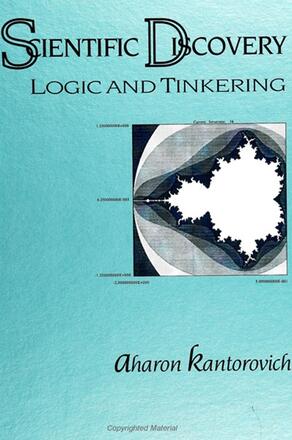Acknowledgments
Introduction
Part I In Search for Logic of Discovery
Chapter 1: Exposing and Generating
1.1 What is a Discovery?
1.2 The Products of Scientific Discovery
1.2.1 What Do Scientists Discover When They Look at the World?
1.2.2 Objects and Events Contaminated by the Scientist's Intervention
1.2.3 The Plasticity of Theories
1.2.4 Explanations, Problems and Solutions
1.3 The Kinds of Discovery Processes
1.3.1 Exposure
1.3.2 Generation
1.3.3 Poincaré: The Poverty of Creation
1.3.4 Eureka Events and Unintentionality
1.4 The Creative Element in Discovery and the Issue of Realism
1.4.1 Discovery, Invention and Creativity
1.4.2 The Case of Particle Physics: An Active Look at Matter
1.4.3 Epistemological Realism: Construction, Transaction and Representation
Chapter 2: The Scope of Method
2.1 The Nature and Function of Method
2.1.1 Who Needs a Method?
2.1.2 What is a Method of Discovery Supposed to Do?
2.1.3 The Origin of Method
2.2 Inferring and Reconstructing
2.2.1 Reasoning vs. Creativity
2.2.2 Discovery as Inference or Reasoning
2.2.3 The Quest for Certainty or: How Ampliative Inference Can Be Converted into Deductive Inference
2.2.4 The Hierarchy of Material Logics
2.2.5 The Discovery Machine
2.2.6 Theory-Construction and Research Programs
2.2.7 The Calculus of Plausibility: Logic of Pursuit
2.2.8 Discovery as a Skill: The Invisible Logic
Chapter 3: Why did Taditional Philosophy of Science Ignore Discovery
3.1 The Distinction between the Context of Discovery and the Context of Justification
3.1.1 John Herschel's Distinction: Consequentialism
3.1.2 Reichenbach's D-J Thesis: Generationism
3.2 Objections to the Distinction
3.2.1 Justification and Discovery are Inseparable
3.2.2 Justification is Not Aprioristic
3.2.3 Information about Generation is Necessary for Evaluation: Predictability and Novelty
3.2.4 The Context of Generation Has an Epistemic Dimension
Part II Discovery Naturalized
The Prepared Mind: Cultivating the Unintentional
Chapter 4: Philosophy of Science: From Justification to Explanation
4.1 Normative Philosophy of Science: Justification Relativized
4.1.1 Instrumental Rationality: Science as a Goal-Directed Activity
4.1.2 The Dilemma of the Normative Methodologist and Goodman's Solution: Rationality without Goals
4.1.3 From Justification to Explication
4.1.4 From Explication to Explanation: Paradigms of Rationality
4.2 From Description to Explanation
4.3 Explanatory Philosophy of Science
4.4 Normative Naturalism: Shallow vs. Deep Theories of Scientific Rationality
4.4.1 Phenomenological Theories of Rationality
4.4.2 Explanatory Theories of Rationality: How the Is-Ought Fallacy is Avoided
4.4.3 Ideal Theories of Rationality and the Competence-Performance Distinction
4.4.4 The Therapist Model of Rationality and its Implications for Involuntary Processes of Discovery
Chapter 5: An Evolutionary Theory of Discovery: In Search for the Unexpected
5.1 Evolutionary Epistemology: Taking Natural Selection Seriously
5.2 Blind Variation: The Principle of Serendipity
5.2.1 Are Scientific Discoveries Analogous to Blind Mutations?
5.2.2 The Evolutionary-Epistemic Significance of Serendipitous Discovery
5.3 Some Implications of the Principle of Serendipity
5.3.1 Predictability and Epistemic Profit
5.3.2 The Mathematical and the Social Media
5.4 Two Landmarks of Serendipity in Physics
5.4.1 Kepler: The Conscious Sleepwalker
5.4.2 Planck: The Reluctant Revolutionist
5.5 Serendipitous Discovery of Natural Phenomena
5.6 Cultivating Serendipity
Chapter 6: Intrapsychic Processes of Creation
6.1 A Psychological Theory of the Creative Process
6.1.1 The Chance-Configuration Model
6.1.2 Phenomena Explained by the Theory and Evidence for Its Support
6.1.3 An Associative Mechanism of Generating Chance Permutations
6.2 Implications of the Theory
6.2.1 Explaining Serendipity
6.2.2 Individual vs. Collective Creativity
6.2.3 Cultivating the Creative Potential
6.2.4 Multiple Discovery
Chapter 7: A Socio-Evolutionary Theory of Science
7.1 Epistemic Cooperation and the Social Dimension of Discovery
7.2 The Social Dimension of Blind Variation, Selection and Dissemination
7.3 Has Science Liberated Humankind from the Tyranny of the Genes?
7.3.1 Genetically Controlled Human Understanding
7.3.2 Transcending Our Natural Habitat
7.3.3 Two Patterns of Human Evolution:
(a) The Principle of Growth by Expansion
(b) The Coevolution of Human Action and Human Understanding
7.3.4 The Epistemological Significance of Cooperation in Science: The Evolutionary Perspective
7.4 The Tension between Change and Stability
7.5 Implications for Discovery
7.5.1 The D-J Distinction Revisited
7.5.2 Cultivation: Preparing the Collective Mind
7.5.3 Strategies of Discovery
Chapter 8: Tinkering and Opportunism: The Logic of Creation
8.1 Evolutionary Tinkering in Science
8.2 Tool-Oriented Scientists: Intellectual Migration
8.3 Tinkering in Particle Physics
8.3.1 Symmetries without Dynamics
8.3.2 The Resources of Quantum Field Theory
8.3.3 Playing with Quarks
8.3.4 Tool-Oriented Particle Physicists
Chapter 9: Completing the Picture: Is There a Role for The Genotype-Phenotype Process?
9.1 Non-Creative Discovery: The Genotype-Phenotype Logic of Growth
9.2 The Selection Cycle in Science
Conclusion
Epilogue: Implications for Science Education
Notes
Bibliography
Index
